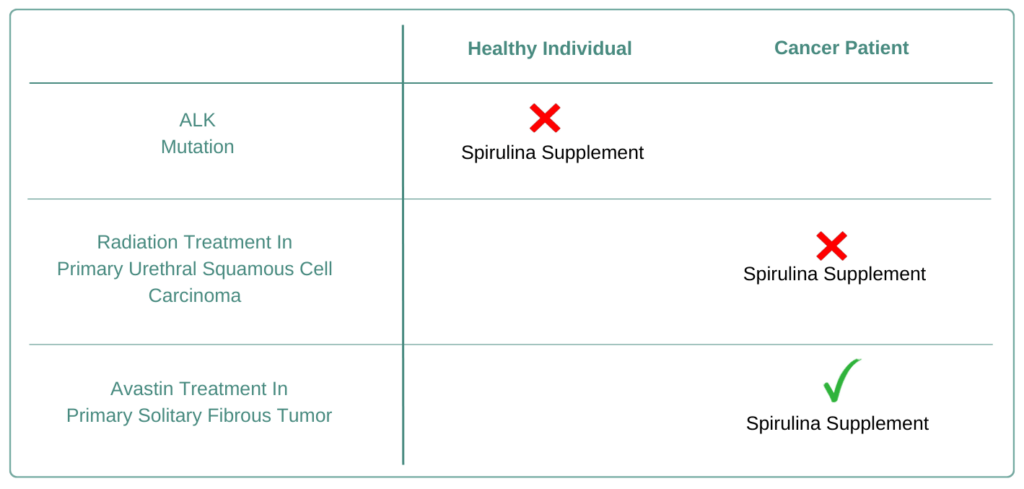Highlights
Spirulina is widely recognized for its health benefits and is frequently used by cancer patients and those at genetic risk. Yet, the safety and effectiveness of Spirulina for cancer patients depend on many factors like the cancer indication, chemotherapy, other treatments, and the tumor’s genetics. Knowing that some foods and supplements, such as grapefruit and spinach, might interact poorly with cancer medications and cause adverse reactions is crucial.
Diet is critical for cancer treatment as it can affect treatment outcomes. Cancer patients must carefully select and incorporate suitable foods and supplements into their diets. For example, Spirulina could benefit those with Primary Solitary Fibrous Tumor undergoing Avastin, but it might not be good for patients receiving Radiation for Primary Urethral Squamous Cell Carcinoma. Furthermore, while Spirulina could help individuals with a genetic risk factor, it may not be suggested for those with a different genetic risk “ALK”. Personalizing diet plans based on health, treatment, and genetics is essential.
Understanding that making a decision on the suitability of Spirulina for a cancer patient needs to be individualized is crucial. Critical factors like the type of cancer, treatment methods, genetic makeup, genetic risks, age, body weight, and lifestyle are vital in deciding if Spirulina is the appropriate choice. Genetics and genomics, in particular, is a significant consideration. Since these factors can evolve, it’s essential to regularly review and adapt dietary choices to match changes in health status and treatment.
In conclusion, a holistic approach to dietary choices is vital, focusing on the overall effects of all active components in foods/supplements like Spirulina instead of assessing each active ingredient separately or ignoring it completely. This broad perspective fosters a more rational and scientific approach to diet planning for cancer.
Brief Overview
Use of plant-based foods and supplements, such as vitamins, herbs, minerals, probiotics, and various specialized supplements, are rising among cancer patients. These supplements are designed to deliver high concentrations of specific active ingredients, many of which are also in different foods. The concentration and diversity of active ingredients differ between whole foods and supplements. Foods typically offer a range of active ingredients but at lower concentrations, while supplements provide higher concentrations of specific ingredients.
Considering the varied scientific and biological functions of each active ingredient at the molecular level, it’s crucial to account for the combined effects of these components when deciding on foods and supplements to eat or not.

The critical question arises: Should you incorporate Spirulina into your diet as a food item or a supplement? Is it advisable to consume Spirulina if you have a genetic predisposition to cancer associated with the gene? What if instead your genetic risk stems from the ALK gene? Is it beneficial to include Spirulina in your diet if you’re diagnosed with Primary Urethral Squamous Cell Carcinoma, or if your diagnosis is Primary Solitary Fibrous Tumor? Moreover, how should your consumption of Spirulina be adjusted if you’re undergoing Avastin treatment or if your treatment plan shifts from Avastin to Radiation? It’s essential to recognize that simplistic assertions like ‘Spirulina is natural, so it’s always beneficial’ or ‘Spirulina boosts immunity’ are insufficient for informed food/supplement choices.
Additionally, it’s essential to reassess the appropriateness of including Spirulina in your diet if there are changes in your treatment regimen. In summary, when making decisions about incorporating foods or supplements like Spirulina into your diet for its benefits, you should consider the overall biochemical effects of all ingredients, considering factors such as the type of cancer, the specific treatments you’re undergoing, genetic predispositions, and lifestyle choices.
Cancer
Cancer remains a significant challenge in the medical field, often causing widespread anxiety. However, recent advancements have improved treatment outcomes, notably through personalized treatment approaches, non-invasive monitoring methods using blood and saliva samples, and the development of immunotherapy. Early detection and timely intervention have been crucial in positively influencing overall treatment outcomes.
Genetic testing offers significant promise in evaluating cancer risk and susceptibility early on. However, for many individuals with familial and genetic predispositions to cancer, options for therapeutic intervention, even with regular monitoring, are often limited or none. Once diagnosed with a specific type of cancer, such as Primary Solitary Fibrous Tumor or Primary Urethral Squamous Cell Carcinoma, treatment strategies need to be customized based on the individual’s tumor genetics, the stage of the disease, as well as factors like age and gender.”
Post-treatment, ongoing monitoring is essential to detect any signs of cancer relapse and to inform subsequent decisions. Many cancer patients and those at risk often seek advice on incorporating certain foods and supplements into their diets, which plays a crucial role in their overall decision-making process regarding health management.
The critical question is whether to factor in genetic risks and specific cancer diagnoses when deciding on dietary choices, such as Spirulina. Does a genetic risk for cancer stemming from a mutation in the gene have the same biochemical pathway implications as a mutation in the ALK? From a nutritional standpoint, does the risk associated with Primary Solitary Fibrous Tumor equate to Primary Urethral Squamous Cell Carcinoma? Furthermore, does the dietary consideration remain the same for those undergoing Radiation as for those receiving Avastin? These considerations are crucial in making informed food choices for individuals with different genetic risks and cancer treatments.
Spirulina – A Nutritional Supplement
The supplement Spirulina encompasses a range of active ingredients, including L-phenylalanine, Glycine, L-leucine and L-glutamic Acid, each present at varying concentrations. These ingredients influence molecular pathways, specifically MYC Signaling, RAS-RAF Signaling and Vitamin D Signaling, which regulate critical aspects of cancer at the cellular level, such as tumor growth, spread, and cell death. Given this biological influence, selecting the appropriate supplements like Spirulina, alone or in combination, becomes a critical decision in the context of cancer nutrition. When considering using Spirulina for cancer, it’s essential to consider these various factors and mechanisms. This is because, similar to cancer treatments, the use of Spirulina is not a universal decision suitable for all cancers but needs to be personalized.
Choosing Spirulina Supplements
Addressing the question ‘When should I avoid Spirulina in the context of Cancer’ is challenging because the answer is highly individualized – it simply ‘Depends!’. Similar to how any cancer treatment may not be effective for every patient, the relevance and safety or benefits of Spirulina varies depending on personal circumstances. Factors such as the specific type of cancer, genetic predispositions, current treatments, other supplements being taken, lifestyle habits, BMI, and any allergies all play a role in determining whether Spirulina is appropriate or should be avoided, underlining the importance of personalized consideration in such decisions.
Foods to Eat After Cancer Diagnosis!
No two cancers are the same. Go beyond the common nutrition guidelines for everyone and make personalized decisions about food and supplements with confidence.
1. Will Spirulina Supplements benefit Primary Urethral Squamous Cell Carcinoma Patients undergoing Radiation treatment?
Primary Urethral Squamous Cell Carcinoma is characterized by particular genetic mutations, namely BLM, BRCA1 and CTCF, which lead to alterations in biochemical pathways, specifically RAS-RAF Signaling, Androgen Signaling and DNA Repair. The effectiveness of a cancer treatment, such as Radiation, is contingent on its mechanism of action on these specific pathways. The ideal strategy involves aligning the treatment’s action with the pathways driving the cancer, thereby ensuring a personalized and effective approach. In such scenarios, avoiding foods or nutritional supplements that might counteract the treatment’s effects or diminish this alignment is crucial. For instance, the Spirulina supplement, which affects the RAS-RAF Signaling, may not be the right choice in the case of Primary Urethral Squamous Cell Carcinoma when undergoing Radiation. This is because it may either exacerbate the disease’s progression or interfere with the treatment’s efficacy. When choosing a nutrition plan, it’s important to consider factors such as cancer type, ongoing treatments, age, gender, BMI, lifestyle, and any known genetic mutations.
2. Will Spirulina Supplements benefit Primary Solitary Fibrous Tumor Patients undergoing Avastin Treatment?
Primary Solitary Fibrous Tumor is identified by specific genetic mutations, such as BRD4, FLI1 and KMT2C, which result in changes in biochemical pathways, particularly MYC Signaling, Chromatin Remodeling, DNA Repair, Oncogenic Histone Methylation and Amino Acid Metabolism. The efficacy of a cancer treatment, like Avastin, is determined by its interaction with these pathways. The aim is to ensure that the treatment aligns well with the pathways that drive the cancer, enabling a personalized treatment approach. In this context, foods or supplements that are compatible with the treatment or enhance this alignment should be considered. For example, the Spirulina supplement is a rational option for those with Primary Solitary Fibrous Tumor undergoing Avastin. This is because Spirulina influences pathways such as MYC Signaling, which can either inhibit the factors driving Primary Solitary Fibrous Tumor or benefit the effectiveness of the Avastin.
3. Are Spirulina Supplements Safe for Healthy Individuals with ALK Mutation Associated Genetic Risk?
Various companies provide gene panels for assessing the genetic risk of different types of cancers. These panels include genes linked to breast, ovarian, uterine, prostate, and gastrointestinal cancers. Testing these genes can confirm a diagnosis and inform treatment and management strategies. Identifying a variant that causes disease can further assist in the testing and diagnosing of relatives who may be at risk. The ALK gene is commonly included in these panels for cancer risk assessment.
A mutation in the ALK gene affects biochemical pathways or processes, such as MYC Signaling and Growth Factor Signaling, which are directly or indirectly involved in driving cancer at the molecular level. When a genetic panel identifies a mutation in the ALK associated with an increased risk of Central Nervous System, scientific rationale suggests avoiding use of supplement Spirulina. This is because supplement Spirulina influences pathways like MYC Signaling, which can lead to adverse effects in the context of the ALK mutation and related cancer conditions.

In Conclusion
The two most important things to remember are that cancer treatments and nutrition are never the same for everyone. Nutrition, including food and supplements like Spirulina, is an effective tool that can be controlled by you while facing cancer.
“What should I eat?” is the most commonly asked question by cancer patients and those at-risk of cancer. The correct response is that it depends on factors such as cancer type, genetics of tumor, current treatments, allergies, lifestyle, and BMI.
Get your nutrition personalization for cancer from addon by clicking the link below and answering questions about your cancer type, treatment, lifestyle, allergies, age, and gender.
Personalized Nutrition for Cancer!
Cancer changes with time. Customize and modify your nutrition based on cancer indication, treatments, lifestyle, food preferences, allergies and other factors.
